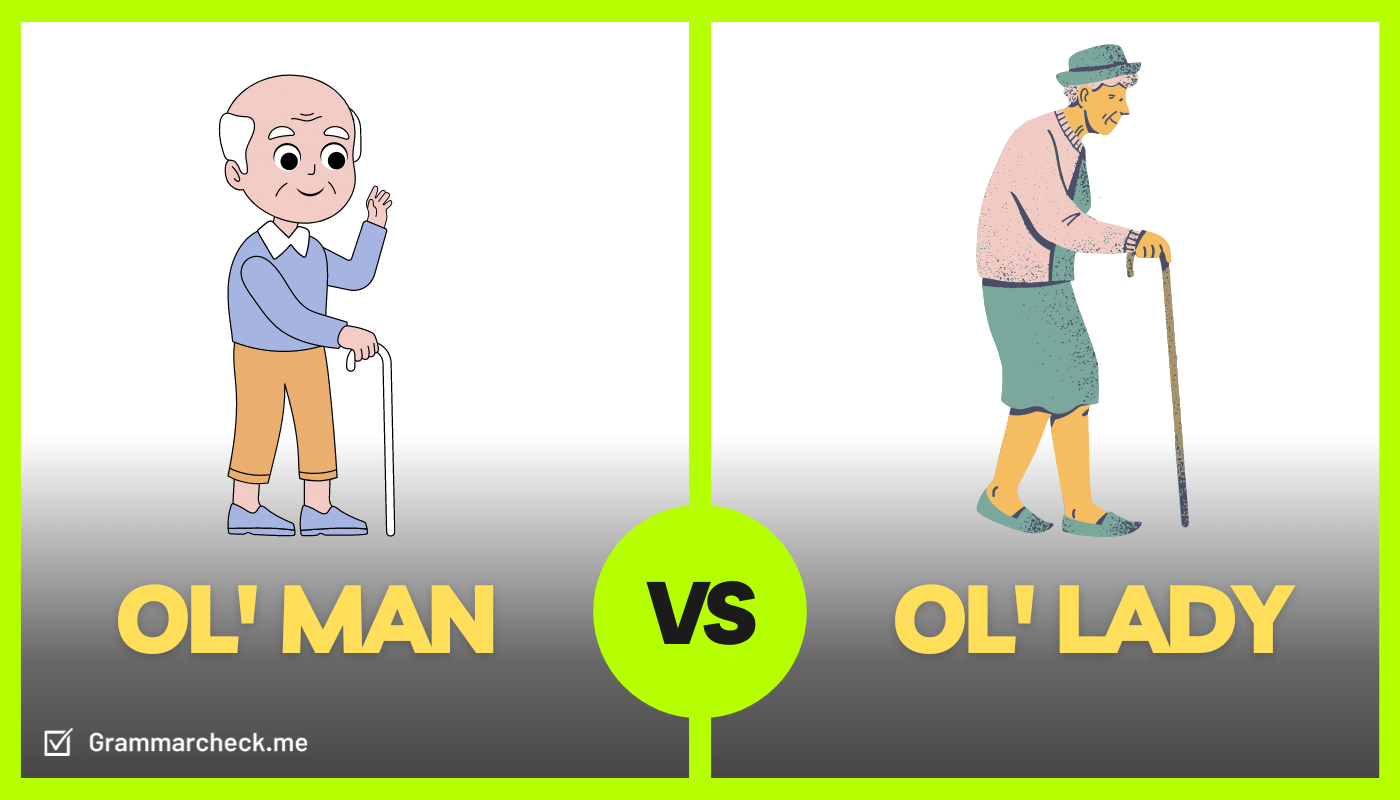The English language is full of colloquial or informal words and phrases that are used in daily conversation. For fluent English speakers these words and phrases are common knowledge. However, for people trying to learn English they can cause confusion. In this post, we’ll teach you about the difference between ole vs ol’ & how to use them correctly in your writing!
What does ol’ mean?

The informal word ol’ is very popular in casual conversation in the Southern United States. However, it can have different meanings depending on the punctuation and context of the sentence.
1) Contraction
The word ol’ is a contraction of old. The literal definition is someone who has lived for a very long time period.
Just like the terms Momma and Moma, ol’ is a term of endearment that should be used only for family members. It should be used as an informal sign of love and respect for an elder such as a mother or father.
- My ol’ man is the best.
- I am a great man today because of how my ol’ lady raised me as a kid.
- Steve’s ol’ grandpa was the most generous man I’ve ever met.
2) Short For Old Lady
OL can have a totally different meaning if there is no apostrophe used. Be sure to read up on basic apostrophe rules to learn more.
OL is commonly used as an abbreviation for “old lady”. This is an informal way to refer to someone girlfriend, wife, or mother. Just like we saw in our post comparing maam or ma’am, informal vocabulary should NOT be used in formal text!
- What is your OL up to tonight?
- Is your OL ok with me coming over for dinner?
- Tell your OL I said “Merry Christmas”!
But just like we saw in our post on sargent or sergeant, small spelling changes can make a huge difference!
3) Office Lady

The letters -OL can be used to mean “office lady”. OL is used as an informal nickname for a woman working in an office which primarily consists of men.
- My girlfriend Jen just got a new office job as a secretary. She is officially an OL (office lady) now!
Remember, this is not a polite term and may be considered offensive to some people. This is the least popular of the use cases for -OL. Just like we saw in our post on lmao meaning, slang is not always appropriate to use!
Sentence Examples
Here are some common sentence example that show how to use ol’ in your writing.
- Steve’s ol’ lady raised that boy well. He is always so well behaved.
- Mark’s ol’ grandpop is a very generous man.
- John was a good ol’ scientist who knew everything about chemical compounds.
Just like we saw in our post comparing the terms deactivate vs inactivate, even small spelling changes can completely change the meaning of a sentence.
What does old mean?
Old is an adjective that describes how long someone or something has been alive. The adjective old is relative to the noun it is describing. According to Collins English Dictionary, it is a more formal word than ol’ and can be used in academic writing.
Sentence Examples
Here are some basic sentence examples that demonstrate how to use the word “old” in your writing.
1. My grandma is quite old & is not as mobile as she used to be.
2. This building is old & needs to be rebuilt.
3. I feel so old today. All of my joints are aching!
4. I’m getting too old to play basketball on the weekends.
5. Steve was a good old boy and always listed to his parents.
Just like we saw in our last post about the word Lense, spelling is very important in your writing!
Geography Based Slang
From a high level, the English language is comprised of prescriptive and descriptive grammar rules. Prescriptive grammar consists of following the traditional grammar rules exactly as they are written in the World College Dictionary and other texts.
Descriptive grammar is more informal and can change depending on where you are at in the country or world! For example, there are slang terms that are used in Philadelphia that would not make sense to someone from Wyoming.
Ol’ is an example of a geography based slang term. This phrase is most commonly used in the South as a contraction for old.
Popularity Analysis
As you can tell from examine Google’s n gram data, “old” is far more popular in formal writing. And that makes sense! Ol’ is a contraction and should not be used in most formal writing situations.
However, just like we have seen in our analysis of the words too cute and to cute, data can change! As culture evolves, so does the vocabulary of our authors. So who knows, one day ol’ may be the word choice instead of old.
Frequently Asked Questions
Ol’ is a contraction for “old”. This means that something or someone has been alive for a long period of time.
It depends on the context of the sentence. If you are trying to use the informal contraction for old, use the spelling ol’. If you are trying to use the abbreviation for old lady, use the spelling -OL.
In an office, OL stands for office lady. For example, “my sister just got a new office job so she is now an OL!”
In management, OL stands for organizational learning.
In southern slang, Ole is a common expression to show excitement.
Bottom Line
By now you should be an expert of the meaning of ol’. This is a colloquial slang term that serves as a contraction of old. It is important that you do not use informal vocabulary in business writing, academic writing or other professional settings! If you need some extra help with this spelling rule, consider using our reword generator to make things easy for you!
